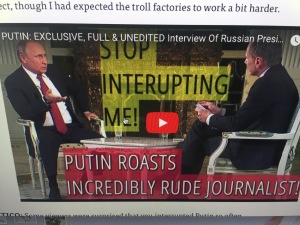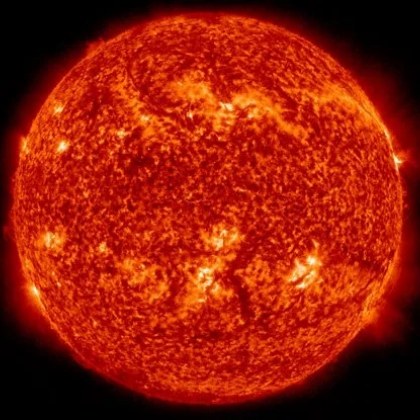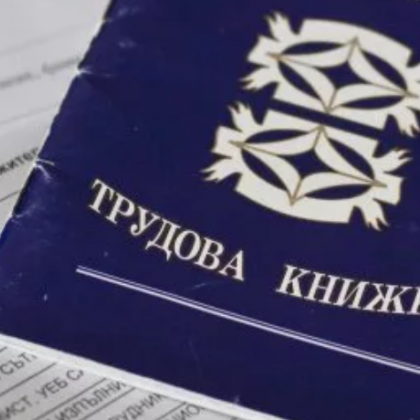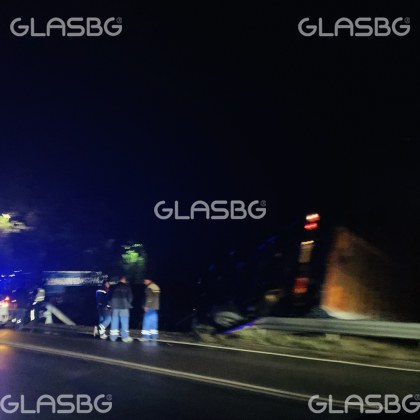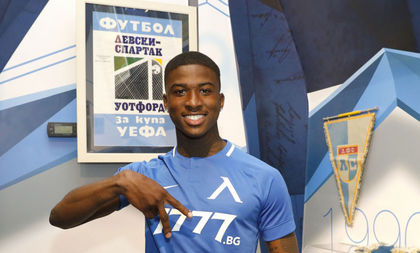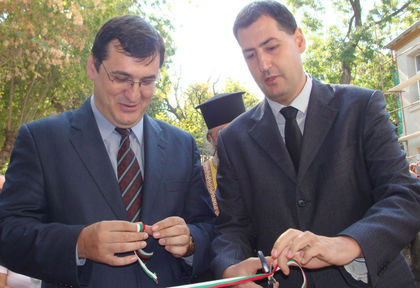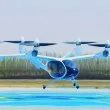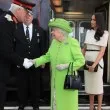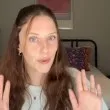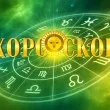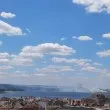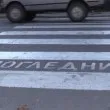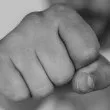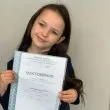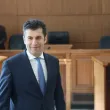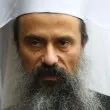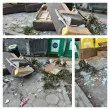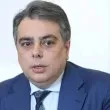–Ш–љ—В–µ—А–≤—О—В–Њ –љ–∞ –∞–≤—Б—В—А–Є–є—Б–Ї–Є—П –ґ—Г—А–љ–∞–ї–Є—Б—В –Р—А–Љ–Є–љ –Т–Њ–ї—Д —Б –Т–ї–∞–і–Є–Љ–Є—А –Я—Г—В–Є–љ –≤ –љ–∞–≤–µ—З–µ—А–Є–µ—В–Њ –љ–∞ –љ–µ–≥–Њ–≤–Њ—В–Њ –њ–Њ—Б–µ—Й–µ–љ–Є–µ –≤ –Р–≤—Б—В—А–Є—П, –Ї–Њ–µ—В–Њ –ґ—Г—А–љ–∞–ї–Є—Б—В—К—В –Њ–њ—А–µ–і–µ–ї—П –Ї–∞—В–Њ –љ–∞–є-—В—А—Г–і–љ–Њ—В–Њ –≤ –ґ–Є–≤–Њ—В–∞ —Б–Є, –љ–µ —Б–∞–Љ–Њ –љ–µ –Њ—Б—В–∞–љ–∞ –њ–Њ—А–µ–і–љ–∞—В–∞ –ґ—Г—А–љ–∞–ї–Є—Б—В–Є—З–µ—Б–Ї–∞ вАЬ–µ–і–љ–Њ–і–љ–µ–≤–≤–Ї–∞вАЭ, –љ–Њ —Б–µ –њ—А–µ–≤—К—А–љ–∞ –≤ –Њ–±–µ–Ї—В –љ–∞ –њ—А–Њ–і—К–ї–ґ–∞–≤–∞—Й –њ—А–Њ—Д–µ—Б–Є–Њ–љ–∞–ї–µ–љ –Є–љ—В–µ—А–µ—Б –Ї—К–Љ –∞–≤—Б—В—А–Є–µ—Ж–∞, –њ–Њ—Б—В–∞–≤–Є–ї –≤ —К–≥—К–ї–∞ —А—Г—Б–Ї–Є—П –њ—А–µ–Ј–Є–і–µ–љ—В.¬†https://www.politico.eu/blogs/on-media/2018/06/armin-wolf-the-art-of-taking-on-vladimir-putin/
 
 
 
 
 
 
–°–њ–Є—Б–∞–љ–Є–µ вАЬ–Я–Њ–ї–Є—В–Є–Ї–ЊвАЭ –Ј–∞–і–∞–≤–∞ 6 –≤—К–њ—А–Њ—Б–∞ –Ї—К–Љ –∞—А–Љ–Є–љ –Т–Њ–ї—Д –Њ–Ї–Њ–ї–Њ вАЬ–Ї—Г—Е–љ—П—В–∞вАЭ –љ–∞ —В–Њ–≤–∞ –Є–љ—В–µ—А–≤—О, –љ–∞—А—Г—И–∞–≤–∞–є–Ї–Є –Њ—Й–µ –µ–і–љ–Њ –љ–µ–њ–Є—Б–∞–љ–Њ —В–∞–±—Г, —Б –Ї–Њ–µ—В–Њ —Б—К—Б —Б–Є–≥—Г—А–љ–Њ—Б—В –і–Њ–њ—К–ї–љ–Є—В–µ–ї–љ–Њ —Й–µ –≤–±–µ—Б–Є –Ъ—А–µ–Љ—К–ї. –ѓ–≤–љ–Њ —В—А–Є—Г–Љ—Д—К—В –љ–∞ –Т–Њ–ї—Д –µ –њ—К–ї–µ–љ –Є —В–Њ–є –љ–µ —Б–µ –Њ–њ–Є—В–≤–∞ –і–∞ вАЬ—Г–Љ–Є–ї–Њ—Б—В–Є–≤–ЄвАЭ –њ–Њ–≤–∞–ї–µ–љ–Є—П –≤ —Б–ї–Њ–≤–µ—Б—В–љ–Є—П –і–≤—Г–±–Њ–є –Њ—В–Љ—К—Б—В–Є—В–µ–ї–µ–љ —А—Г—Б–Ї–Є —Б–∞–Љ–Њ–і—К—А–ґ–µ—Ж, –Ї–Њ–є—В–Њ –љ–µ –µ —Б–≤–Є–Ї–љ–∞–ї –і–∞ –±—К–і–µ —В—А—К—И–Ї–∞–љ –љ–∞ –њ—Г–±–ї–Є—З–љ–Є—П —В–µ–њ–Є—Е –Њ—В –љ—П–Ї–∞–Ї–≤–Є —Б–Є –ґ—Г—А–љ–∞–ї–Є—Б—В–Є. –°—К–Њ—В–≤–µ–љ–Њ –Т–Њ–ї—Д –љ–µ —Б–њ–µ—Б—В—П–≤–∞ –љ–Є—Й–Њ –љ–∞ –Я—Г—В–Є–љ –Є –≤ –Њ—В–≥–Њ–≤–Њ—А–Є—В–µ —Б–Є –љ–∞ –Є–љ—В–µ—А–≤—О—В–Њ, –љ–Њ –±–µ–Ј –і–∞ –њ—А–Є–Љ–Є–љ–∞–≤–∞ –≥—А–∞–љ–Є—Ж–∞—В–∞ —З—А–µ–Ј –љ—П–Ї–∞–Ї–≤–∞ —Д–Њ—А–Љ–∞ –љ–∞ —Б–∞–Љ–Њ–Є–Ј—В—К–Ї–≤–∞–љ–µ.
 
–Ю—В —Д–∞–Ї—В–Њ–ї–Њ–≥–Є—П—В–∞, —Б–њ–Њ–і–µ–ї–µ–љ–∞ –Њ—В –Р—А–Љ–Є–љ –Т–Њ–ї—Д, —Б—В–∞–≤–∞ —П—Б–љ–Њ –Ї–Њ–ї–Ї–Њ —Б–∞–Љ–Њ—Г–≤–µ—А–µ–љ –µ –±–Є–ї –Я—Г—В–Є–љ, —З–µ —Й–µ вАЬ—Б—Е—А—Г—Б–Ї–∞вАЭ –њ–Њ—А–µ–і–љ–Є—П –ґ–µ–ї–∞–µ—Й –і–∞ –Љ—Г –Ј–∞–і–∞–≤–∞ –≤—К–њ—А–Њ—Б–Є, –Љ–∞–Ї–∞—А –Њ–њ–Є—В—К—В –Љ—Г —Б—К—Б –Ј–∞–њ–∞–і–љ–Є –ґ—Г—А–љ–∞–ї–Є—Б—В–Є –≤ —В–Њ–Ј–Є –ґ–∞–љ—А –і–∞ –µ –Ї—А–∞–є–љ–Њ –Њ–≥—А–∞–љ–Є—З–µ–љ. –Ґ–Њ–≤–∞ —Б–∞–Љ–Њ—З—Г–≤—Б—В–≤–Є–µ –ї–Є—З–Є –Њ—В —Г—Б–ї–Њ–≤–Є–µ—В–Њ –љ–∞ –Ї—А–µ–Љ—К–ї—Б–Ї–∞—В–∞ –∞–і–Љ–Є–љ–Є—Б—В—А–∞—Ж–Є—П –Є–љ—В–µ—А–≤—О—В–Њ –і–∞ –±—К–і–µ –Є–ї—К—З–µ–љ–Њ –≤ –њ—К–ї–µ–љ –Њ–±–µ–Љ. –Х, –Є–Ј–ї—К—З–Є—Е–∞ –≥–Њ –Є —Б–µ –≤–Є–і—П –≤ –њ—К–ї–µ–љ –Њ–±–µ–Љ, —З–µ –Ї–Њ–≥–∞—В–Њ –љ–∞—Б—А–µ—Й–∞ —Б–Є –Є–Љ–∞ –∞–≤—В–µ–љ—В–Є—З–µ–љ, –∞ –љ–µ —Д–∞–ї—И–Є–≤ вАЬ–љ–Њ–≤–Є–љ–∞—АвАЭ, —Б—К–Њ–±—А–∞–Ј—П–≤–∞—Й —Б–µ —Б —Д–∞–ї—И–Є–≤–Є—В–µ –Љ—Г –љ–Њ–≤–Є–љ–Є, –Я—Г—В–Є–љ –Є–Ј–њ–∞–і–∞ –≤ —П—А–Њ—Б—В –Є —Б–Є –Є–Ј–њ—Г—Б–Ї–∞ –љ–µ—А–≤–Є—В–µ вАУ –Ї–Њ–ї–Ї–Њ—В–Њ –Є –Т–Њ–ї—Д –±–ї–∞–≥–Њ–і–Њ—А–і–љ–Њ –і–∞ —В–≤—К—А–і–Є —Б–µ–≥–∞, —З–µ –≤—Б—К—Й–љ–Њ—Б—В –Я—Г—В–Є–љ —Б–µ –µ –Ї–Њ–љ—В—А–Њ–ї–Є—А–∞–ї –Љ–љ–Њ–≥–Њ –і–Њ–±—А–µ.
 
–°—А–µ–і –Љ–µ—Е–∞–љ–Є–Ј–Љ–Є—В–µ –Ј–∞ –њ–Њ–і—З–Є–љ—П–≤–∞–љ–µ –љ–∞ –≤–Њ–і–µ—Й–Є—П –љ–∞ —Б–≤–Њ–Є—В–µ —Ж–µ–ї–Є, –Є–Ј–њ–Њ–ї–Ј–≤–∞–љ–Є –Њ—В –Я—Г—В–Є–љ, –Р—А–Љ–Є–љ –Т–Њ–ї—Д –њ–Њ—Б–Њ—З–≤–∞ –љ–Њ–Љ–µ—А–∞ –љ–∞ —А—Г—Б–Ї–Є—П –њ—А–µ–Ј–Є–і–µ–љ—В ¬†–і–∞ –≤–ї–Є–Ј–∞ –≤ –њ–Њ–і—А–Њ–±–љ–Њ—Б—В–Є, –Ї–Њ–Є—В–Њ –љ–µ —Б–∞ —В–µ–Љ–∞ –љ–∞ –Є–љ—В–µ—А–≤—О—В–Њ –Є –і–∞ –Є–Ј–Љ–µ—Б—В–≤–∞ –∞–Ї—Ж–µ–љ—В–∞ –љ–∞ —А–∞–Ј–≥–Њ–≤–Њ—А–∞ ( –ї—О–±–Є–Љ–Њ –љ–∞—Е–∞–ї—Б—В–≤–Њ –Є –љ–∞—И–Є—П –њ—А–µ–Љ–Є–µ—А –С–Њ—А–Є—Б–Њ–≤, –љ–∞ –Ї–Њ–µ—В–Њ –љ–Є–Ї–Њ–є —В—Г–Ї, –Њ—В –Љ–љ–Њ–≥–Њ–±—А–Њ–є–љ–Є—В–µ –Є–љ—В–µ—А–≤—О–Є—А–∞—Й–Є –≥–Њ, –љ–µ —Б–Љ–µ–µ –і–∞ —Б–µ –њ—А–Њ—В–Є–≤–Њ–њ–Њ—Б—В–∞–≤–Є). –Ґ–Њ–≤–∞ –њ–Њ—Б—В–∞–≤—П –ґ—Г—А–љ–∞–ї–Є—Б—В–∞ –љ–∞—Б—А–µ—Й–∞ –≤ –њ–Њ–ї–Њ–ґ–µ–љ–Є–µ—В–Њ –і–∞ —Б–µ —Б—К–≥–ї–∞—Б–Є –і–∞ –Љ—Г –±—К–і–µ —Б—К—Б–Є–њ–∞–љ –Ј–∞–Љ–Є—Б—К–ї—К—В –Є–ї–Є –і–∞ –≥–Њ –њ—А–µ–Ї—К—Б–љ–µ, –Ј–∞ –і–∞ –≥–Њ –≤—К—А–љ–µ –љ–∞ –≤—К–њ—А–Њ—Б–∞ ( –њ–Њ–Љ–љ–Є—В–µ –ї–Є –Ї–∞–Ї –С–Њ—А–Є—Б–Њ–≤ –љ–µ–µ–і–љ–Њ–Ї—А–∞—В–љ–Њ —Б–µ –µ –Њ–±–∞–ґ–і–∞–ї –≤ —Б—В—Г–і–Є–Њ—В–Њ –љ–∞ –њ—А–µ–і–∞–≤–∞–љ–Є—П –Є –≤–Ј–Є–Љ–∞–є–Ї–Є –і—Г–Љ–∞—В–∞ –Ј–∞ –±–µ–Ј–Ї—А–∞–Є–љ–Є—В–µ —Б–Є –Љ–Њ–љ–Њ–ї–Њ–Ј–Є, –±—Г–Ї–≤–∞–ї–љ–Њ вАЬ–Є–Ј—П–ґ–і–∞вАЭ –≤—А–µ–Љ–µ—В–Њ –Є –ї–Є–Ї–≤–Є–і–Є—А–∞ —Ж—П–ї–∞—В–∞ –Є–і–µ—П –љ–∞ –њ—А–µ–і–∞–≤–∞–љ–µ—В–Њ?).
 
–Я–Њ–≤–µ—З–µ—В–Њ –њ–Њ–ї–Є—В–Є—Ж–Є –Њ–±–Є–Ї–љ–∞–≤–µ–љ–Њ –њ—А–µ–Љ—К–ї—З–∞–≤–∞—В –Є –љ–µ –≤—К–Ј—А–∞–Ј—П–≤–∞—В, —З–µ —Б–∞ –њ—А–µ–Ї—К—Б–љ–∞—В–Є –Є–ї–Є –њ—А–µ–љ–µ–±—А–µ–≥–≤–∞—В —В–Њ–Ј–Є —Д–∞–Ї—В, –њ—А–Њ–і—К–ї–ґ–∞–≤–∞–є–Ї–Є –і–∞ –≥–Њ–≤–Њ—А—П—В –Ї–∞–Ї–≤–Њ—В–Њ —Б–∞ —Б–Є –љ–∞–Љ–Є—Б–ї–Є–ї–Є, –Ї–∞–Ј–≤–∞ –Т–Њ–ї—Д . –Э–Њ –Я—Г—В–Є–љ —А–µ–∞–≥–Є—А–∞ —Б –≤—К–Ј–Љ—Г—Й–µ–љ–Є–µ –љ–∞ –≤—Б—П–Ї–Њ –њ—А–µ–Ї—К—Б–≤–∞–љ–µ. –Ь–∞–Ї–∞—А –Є —В–Њ –і–∞ –µ –Њ—Б–љ–Њ–≤–∞—В–µ–ї–љ–Њ, –љ–∞ —В—А–µ—В–Є—П, —З–µ—В–≤—К—А—В–Є—П –њ—К—В —Б–µ —Б—К–Ј–і–∞–≤–∞ –≤–њ–µ—З–∞—В–ї–µ–љ–Є–µ, —З–µ –ґ—Г—А–љ–∞–ї–Є—Б—В—К—В —Б–µ –і—К—А–ґ–Є –≥—А—Г–±–Њ –Є –љ–µ —Б–µ –Є–љ—В–µ—А–µ—Б—Г–≤–∞ –Њ—В –Њ—В–≥–Њ–≤–Њ—А–Є—В–µ –љ–∞ —Б—К–±–µ—Б–µ–і–љ–Є–Ї–∞, –Ї–∞–Ј–≤–∞ –Т–Њ–ї—Д –њ—А–µ–і вАЬ–Я–Њ–ї–Є—В–Є–Ї–ЊвАЭ.
 
–Ш –≤—Б–Є—З–Ї–Њ —В–Њ–≤–∞ —Б–µ —А–∞–Ј–Є–≥—А–∞–≤–∞ ¬†–љ–µ –≤ —Б—В—Г–і–Є–Њ—В–Њ –љ–∞ –≤–Њ–і–µ—Й–Є—П, –Ї—К–і–µ—В–Њ —В–Њ–є —Б–µ —З—Г–≤—Б—В–≤–∞ —Г –і–Њ–Љ–∞, –∞ –≤ –Ъ—А–µ–Љ—К–ї, –Ї—К–і–µ—В–Њ –Я—Г—В–Є–љ –Є –∞–і–Љ–Є–љ–Є—Б—В—А–∞—Ж–Є—П—В–∞ –Љ—Г —Б–∞ –њ—К–ї–љ–Є –≥–Њ—Б–њ–Њ–і–∞—А–Є, –Њ—В–±–µ–ї—П–Ј–≤–∞ –Р—А–Љ–Є–љ –Т–Њ–ї—Д –≤ –Њ—В–≥–Њ–≤–Њ—А –љ–∞ –≤—К–њ—А–Њ—Б –Ї–Њ—П –µ –±–Є–ї–∞ –љ–∞–є-—В—А—Г–і–љ–∞—В–∞ —З–∞—Б—В –Њ—В –Є–љ—В–µ—А–≤—О—В–Њ. –° –і—А—Г–≥–Є –і—Г–Љ–Є, –Њ—В –Ъ—А–µ–Љ—К–ї —Б–∞ –љ–∞–њ—А–∞–≤–Є–ї–Є –≤—Б–Є—З–Ї–Њ –≤—К–Ј–Љ–Њ–ґ–љ–Њ –і–∞ —Б–њ–µ—З–µ–ї—П—В вАЬ–њ–Њ —В–Њ—З–Ї–ЄвАЭ, –љ–Њ –Р—А–Љ–Є–љ –≥–Є –µ –Є–Ј–љ–µ–љ–∞–і–∞–ї –љ–µ —Б–∞–Љ–Њ —Б –Њ—В–ї–Є—З–љ–Њ—В–Њ –њ–Њ–Ј–љ–∞–≤–∞–љ–µ –љ–∞ —В–µ–Љ–Є—В–µ, –≥–Њ—В–≤–µ–є–Ї–Є —Б–µ 5 –і–љ–Є –њ–Њ –њ—А–µ–і–Є—И–љ–Є –Є–љ—В–µ—А–≤—О—В–∞ –љ–∞ –Я—Г—В–Є–љ –Є —З—А–µ–Ј –Ї–Њ–љ—Б—Г–ї—В–∞—Ж–Є–Є —Б —А—Г—Б–Ї–Є —Б–њ–µ—Ж–Є–∞–ї–Є—Б—В–Є, –љ–Њ –Є –њ—А–µ–і–Є –≤—Б–Є—З–Ї–Њ —Б —Д–∞–Ї—В–∞, —З–µ –љ–µ —Б–µ –µ –Њ–≥—К–љ–∞–ї –њ–Њ–і —В–µ–ґ–µ—Б—В—В–∞ –љ–∞ —Ж–µ–ї–Є—П –њ—Б–Є—Е–Њ–ї–Њ–≥–Є—З–µ—Б–Ї–Є –Љ–Є–Ј–∞–љ—Б—Ж–µ–љ.
 
–Ш–Ј–Њ–±—Й–Њ –Р—А–Љ–Є–љ –µ –±–Є–ї –∞—А–Љ–Є—А–∞–љ, –≤—К–Њ—А—К–ґ–µ–љ –Ј–∞ –±–Є—В–Ї–∞ –Є —П —Б–њ–µ—З–µ–ї–Є –Ј—А–µ–ї–Є—Й–љ–Њ, –њ—А–Є–љ—Г–ґ–і–∞–≤–∞–є–Ї–Є —Б–≤–µ—В–Њ–≤–љ–Є—П —И–∞–Љ–њ–Є–Њ–љ –њ–Њ –љ–µ–≤—К–Ј–Љ—Г—В–Є–Љ–Њ—Б—В –≤ –Ї–∞—В–µ–≥–Њ—А–Є—П—В–∞ вАЬ–Ї–∞–Ї–≤–Њ –Њ—В —В–Њ–≤–∞вАЭ , –Ї–∞–Ї—В–Њ —Б–∞–Љ –љ–∞—А–Є—З–∞ –Я—Г—В–Є–љ –≤ –Є–љ—В–µ—А–≤—О—В–Њ —Б–Є –Ј–∞ вАЬ–Я–Њ–ї–Є—В–Є–Ї–ЊвАЭ, –і–∞ —Б–µ –Њ–њ—А–∞–≤–і–∞–≤–∞ –њ—А–µ–і —Ж–µ–ї–Є—П —Б–≤—П—В.https://www.politico.eu/blogs/on-media/2018/06/armin-wolf-the-art-of-taking-on-vladimir-putin/
 
 
6 QUESTIONS FOR
Armin Wolf, the journalist who stood up to PutinHereвАЩs how the Austrian TV host did it.
By MATTHEW KARNITSCHNIG6/7/18, 8:28 PM CET
Updated 6/9/18, 10:51 
Austrian anchorman Armin Wolf has had his share of difficult interviews. As one of the hosts of Austrian televisionвАЩs nightly public affairs program, he is famous for giving the countryвАЩs elite the third-degree on live television.
Wolf came to international attention this week for subjecting Vladimir Putin to that same treatment ahead of the Russian presidentвАЩs state visit to Austria on Tuesday. Interviews by Western media with Putin are rare enough. What set the AustrianвАЩs nearly hourlong chat with the Russia leader apart is that he succeeded in putting Putin on the defensive by interrupting and peppering him with tough follow-up questions on everything from troll factories to chemical attacks in Syria.
Wolf discussed the experience of interviewing EuropeвАЩs most-feared leader with POLITICOвАЩs Chief Europe Correspondent Matthew Karnitschnig. What follows is an edited transcript.
POLITICO: What kind of reaction did you receive after the interview?
WOLF: The reaction was very positive. I was especially pleased by the very friendly comments from Western colleagues based in Moscow who know Russia well. The reaction from within Russia was what you would expect, though I had expected the troll factories to work a bit harder.
 
POLITICO: Some viewers were surprised that you interrupted Putin so often.
WOLF: I actually didnвАЩt think the interview was that tough. I handled it like I always do and was surprised that such a big deal was made over the fact that I interrupted him 11 times.¬†Eleven times in 54 minutes is¬†really not very much, sometimes I do that in 10 minutes.
-
MATTHEW KARNITSCHNIG
POLITICO: What conditions did the Kremlin place on the interview?
WOLF: The first condition was that¬†a senior anchor from Vienna¬†conduct the interview¬†and not our Moscow correspondent,¬†the second was that we¬†air¬†at least¬†15 minutes of it in prime time, and the third was that we agree to a full German-language transcript, not just of the excerpts we broadcast, that the Kremlin could post on its website.¬†A few days before the interview, the Kremlin press office asked for a list of topics weвАЩd like to discuss and I sent them 10 general areas. They asked for a maximum of six and I sent them six very general subject areas, such as RussiaвАЩs relationship with Austria, the Ukraine and Crimea, Syria, etc. There was never a debate over getting the questions in advance, which I wouldnвАЩt have done. There wasnвАЩt any issue that was off-limits.
POLITICO: How did you prepare?
WOLF: The first thing I did was watch all the available Putin interviews of the past years. That was very helpful because it quickly became clear how Putin reacts in interviews and thatвАЩs exactly how he reacted, not that it made it any easier to handle him. I also spoke at length with some Russia experts and read quite a lot. I did five days of intense preparation for the interview.
POLITICO: YouвАЩve been doing this for a couple of decades now and have confronted plenty of tough interview partners. What was Putin like in comparison?
WOLF: It was definitely the toughest interview that IвАЩve ever done, for three reasons. First, thereвАЩs a big difference if I do an interview here in the studio on my show where IвАЩm effectively the man of the house or if I do it in the presidential palace in the Kremlin in front of the president of the Russian Federation, where itвАЩs clear that heвАЩs the man of the house and every interruption is considered a l√®se-majest√©.вАЭ
The second difficult aspect was the simultaneous translation, which makes it more difficult to respond spontaneously.
The third issue is that Putin is an extremely canny conversationalist who does a few things that make life difficult for the interviewer. He speaks expansively and goes into a lot of detail.¬†The moment you interrupt him, he focuses¬†on¬†the interruption.¬†Politicians rarely do that. Either they allow themselves to be interrupted or they ignore you and keep speaking. But Putin addresses every interruption, which helps him because after the third or the fourth time, the interviewer appears rude or not particularly interested in his answers. He also often responds to questions with his own question and he is a world champion in Whataboutism. HeвАЩs very quick at diverting attention from a subject. You ask him about corruption in Russia and he starts discussing corruption in Ukraine.
HeвАЩs very difficult to draw out. He doesnвАЩt say a word that he doesnвАЩt intend to. HeвАЩs extremely controlled.
POLITICO: What were you impressions of him off-camera?
WOLF: There wasnвАЩt much contact off-camera. We had to wait more than three and a half hours for the interview. It was scheduled for 6 p.m., then pushed to 8, but we didnвАЩt get underway until almost 10.¬†Mr. Putin gave us a short, friendly greeting in German and¬†after the interview¬†we took a picture with the team.¬†What you saw on TV was 97 percent of my interaction with him. The only difference is that off-camera he speaks German and very softly. I found that to be the most interesting part.¬†And his¬†German is very good.
–Я—А–Њ—З–µ—В–µ—В–µ –Њ—Й–µ
- 17:01 –°–µ–Ї—Г–љ–і–Є –Њ—В —В—А–∞–≥–µ–і–Є—П: –Ь–∞–є–Ї–∞ —Б–њ–∞—Б–Є –±–µ–±–µ—В–Њ —Б–Є –љ–∞ –њ–µ—И–µ—Е–Њ–і–љ–∞ –њ—К—В–µ–Ї–∞ –≤ –°–Њ—Д–Є—П
- 16:07 –Ш–Ј–і–Є—А–≤–∞—В –Њ—В–љ–Њ–≤–Њ –Љ–∞–ї–Ї–Є—П –•–Њ—Б–µ, –Є–Ј—З–µ–Ј–љ–∞–ї –Є –≤—З–µ—А–∞ –≤ –°–Њ—Д–Є—П* –°–Э–Ш–Ь–Ъ–Р
- 15:00 –Ю—В—Е–≤—К—А–ї–µ–љ –Њ—В —Б–Є—Б—В–µ–Љ–∞—В–∞: –Ы—О–±—З–Њ –≥–∞—Б–љ–µ –±–∞–≤–љ–Њ –љ–∞ —Г–ї–Є—Ж–∞—В–∞. –Ф–∞ –њ–Њ–Љ–Њ–≥–љ–µ–Љ!
- 19:00 –Ф–ґ—Г–ї–∞–є –Ь–Њ—А–љ–Є–љ–≥ –Є–ї–Є –Ф–ґ—Г–ї–∞–є –Ь—А—К—Б–Њ—В–Є—П? –Т–Ш–Ф–Х–Ю
